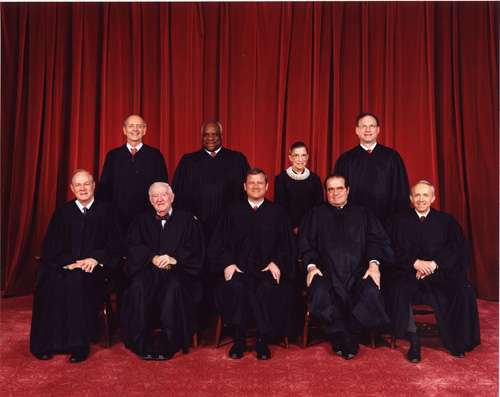The Volokh Conspiracy
Mostly law professors | Sometimes contrarian | Often libertarian | Always independent
Today in Supreme Court History: November 24, 2001
11/24/2001: Salim Hamdan was captured in Afghanistan. The Supreme Court would decide his case in Hamdan v. Rumsfeld (2006).

Editor's Note: We invite comments and request that they be civil and on-topic. We do not moderate or assume any responsibility for comments, which are owned by the readers who post them. Comments do not represent the views of Reason.com or Reason Foundation. We reserve the right to delete any comment for any reason at any time. Comments may only be edited within 5 minutes of posting. Report abuses.
Please to post comments


Hotel Employees Local 255 v. Leedom, 358 U.S. 99 (decided November 24, 1958): Court here ends the NLRB’s longstanding hands-off policy as to hotels keeping unions out
Kedroff v. St. Nicholas Cathedral of Russian Orthodox Church, 344 U.S. 94 (decided November 24, 1952): striking down on Free Exercise grounds New York statute requiring Russian Orthodox churches to have separate in-state corporate status (as opposed to being administratively subject to Patriarch of Moscow); the opinion contains a history of the disruption caused by the Bolshevik Revolution and Patriarch’s eventual accommodation with the Soviets (the American branch had the right to disassociate when that happened, but it couldn’t be required by law)
Hawkins v. United States, 358 U.S. 74 (decided November 24, 1958): conviction under Mann Act (transporting woman across state boundaries for prostitution) overturned; issue was over the purpose of the trip, and error to allow defendant’s wife to testify against him (violated common law rule as to spousal testimony, and wife was also a prostitute and had conflict of interest) (Stewart, concurring, calls the rule against spousal testimony “a sentimental relic”)
Hawkins was effectively overruled in Trammel v. United States, 445 U.S. 40 (1980), so now the testimonial privilege resides only with the witness-spouse who may testify against his or spouse in a criminal case, even over the objection of the party-spouse, though one spouse cannot be compelled to testify against the other.
Of course, this only applies in federal court, and the majority of states still apply the old common law rule, in which the party-spouse can prevent the witness-spouse from testifying against him.
Thanks! I’ll add that next time
and 5 years later the D.C. Court of Appeals Vacated Ham-Damn's conviction, Big Brain Brett "I like Beer" Kavanaugh wrote the opinion, surprised Barry Hussein didn't invite him (Ham-Damn, not Brett) to the Rose Garden for a Beer.
Frank
The limits on the federal government’s power to control enemy combatants in hindsight turned out to be limited.
In this case, the opinion and dissent (Scalia) from the bench was over 34 minutes. Roberts did not take part. Roberts later dissented in Boumediene v. Bush, a 5-4 opinion regarding enemy combatants.
https://www.oyez.org/cases/2005/05-184
GITMO is still open today with a much smaller population.
Thomas also dissented from the bench in Hamdan.
I thought Barry Hussein was going to close it? Must be doing it on "CPT"
Some other events of legal history that would have some SCOTUS influence …
1871 – The National Rifle Association was incorporated in the U.S.
1928 – The first federal prison for women opens in West Virginia
1947 – The “Hollywood 10,” were cited for contempt of Congress for refusing to answer questions about alleged Communist influence in their industry.
1993 – The U.S. Congress gave its final approval to the Brady handgun control bill.
And, since birthdays and deaths have been of interest here, Zachary Taylor was born in 1784. Taylor was responsible for nearly no federal judges. His successor, Millard Fillmore nominated Benjamin Curtis, a Dred Scott dissenter.
(All took place on this date, of course)
A metacomment about the development of the comments on this daily feature as I have seen them…
On the pass through the first year or these posts there were not very many comments, and mostly they tended to be be quibbles about the article — typos, date errors and such. Then on the second pass CaptCrisis (recently revealed as Dan Schiavetta) started adding a regular inclusive comment which was rigorously confined to decisions released on the given day. These generated a lot of daily discussion, but the discussion usually ignored the original posting.
But now things have turned again. There’s now often a lot of discussion of the original posting even when it is about the appointment or birth or death of some obscure justice. My take is that the response to Dan’s comments, built up a general interest in these posts, and people started looking at the original post with more interest.
The regular contribution of Dan and Josh and the other commentators has developed into one of the more interesting niches on this site. And now we’re getting other dailyish contributors, e.g., JoeFromTheBronx. Thanks to you all!
Glad to be of service. Thanks!